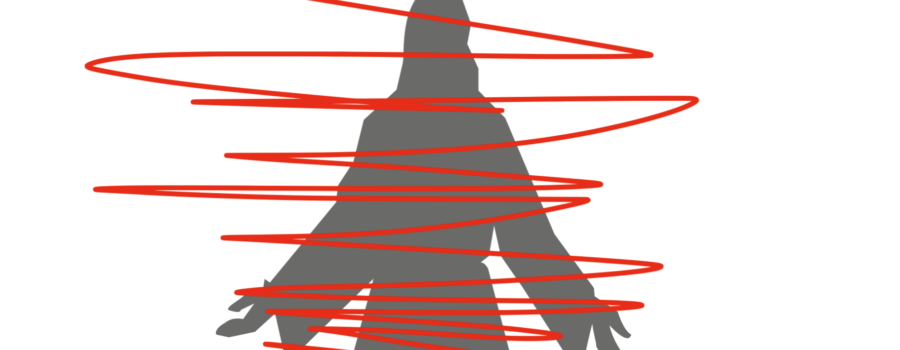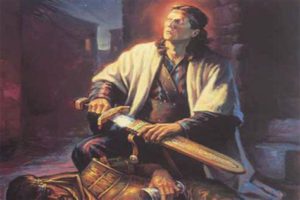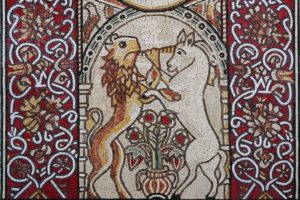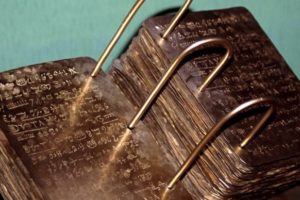In Part 1 of this series, Ya’akov ben Y’hudah discussed a number of the “lost” books of the Tanakh, and compared them with the Brass Plates prophets who do not appear in our current scriptural record. He also cited evidence that certain prophets were excluded because of their explicit teachings about Messiah. In this post, we’ll consider some of the teachings of the “lost” prophets preserved in the Stick of Joseph in the Hand of Ephraim.
Given the content of Part 1, it should come as no surprise to us that the “lost prophets” of the Brass Plates, gave some of the clearest prophecies concerning the Messiah. Let’s consider the following example:
And behold, he comes, according to the words of the angel, in six hundred years from the time my father left Yerushalayim. And the world, because of their iniquity, shall judge him to be a thing of no value. Wherefore, they scourge him and he allows it; and they smite him and he allows it; yes, they spit upon him and he allows it, because of his lovingkindness and his long-suffering towards the children of men. And the Elohim of our fathers who were led out of Egypt, out of bondage, and also were preserved in the wilderness by him — yes, the Elohi of Avraham, and of Yitz’chak, and the Elohi of Ya’akov — yields himself, according to the words of the angel, as a man into the hands of wicked men, to be lifted up according to the words of Zenoch, and to be crucified according to the words of Ne’um, and to be buried in a sepulcher according to the words of Zenos, which he spoke concerning the three days of darkness which should be a sign given of his death unto those who should inhabit the isles of the sea — more especially given unto those who are of the house of Isra’el (1 Nefi 5:36).
This passage was written by Nefi—the one who retrieved the brass plates from Jerusalem. He quotes the words of Zenoch, Ne’um and Zenos in their specific prophecies regarding the Messiah. Though these prophets, and their prophecies remained on the Plates of Brass, they are missing from the records that have made their way to us in the Tanakh. No such specific prophecies about the Messiah are found there, and only oblique references remain. It’s almost as though there were an intentional effort, somewhere along the line, to remove information about the Messiah.
It’s also worth noting that Nefi, when he wanted to teach his brothers about Messiah, didn’t use the words of Zephaniah, Obadiah, Nahum, Habakuk, or other familiar first-temple-period prophets whose records we currently have; no, he reached for Zenoch, Ne’um and Zenos. This tells us something specific about these particular prophets and why they are missing: They taught most clearly about Messiah, and therefore were targeted for deletion from the records.
Here are some more words from the “missing” prophets:
And now Alma said unto them, Do you believe those scriptures which have been written by them of old? Behold, if you do, you must believe what Zenos said; for behold, he said, You have turned away your judgments because of your Son. Now behold, my brothers, I would ask if you have read these scriptures. If you have, how can you disbelieve on the Son of Elohim? For it is not written that Zenos alone spoke of these things, but Zenoch also spoke of these things, for behold, he said, You are angry, O Adon, with this people because they will not understand of your mercies which you have bestowed upon them because of your Son. And now, my brothers, you see that a second prophet of old has testified of the Son of Elohim. And because the people would not understand his words, they stoned him to death (Alma 16:32).
Here we learn from Alma that the prophet Zenos was actually stoned to death because he prophesied of Messiah. Alma then continues with an interesting bit of information regarding Moses:
But behold, this is not all; these are not the only ones who have spoken concerning the Son of Elohim. Behold, he was spoken of by Moshe; yes, and behold, a type was raised up in the wilderness, that whosoever would look upon it might live. And many did look and live. But few understood the meaning of those things, and this because of the hardness of their hearts (Alma 16:32).
According to Alma, Moses actually spoke of the son of God, apparently in conjunction with raising the brass serpent in the wilderness. Though we may, even now, recognize the brass serpent as a type and shadow of the Messiah, we no longer have any record in the Tanakh of Moses’s teachings on the subject and his declarations concerning the son of God.
A later and different Nefi, the son of Cheleman, also mentions Moses’s lost teachings on the subject of Messiah in speaking to the apostate Nefites:
But behold, you not only deny my words, but you also deny all the words which have been spoken by our fathers, and also the words which were spoken by this man, Moshe, who had such great power given unto him — yes, the words which he has spoken concerning the coming of the Mashiach. Yes, did he not bear record that the Son of Elohim should come? And as he lifted up the brazen serpent in the wilderness, even so shall he be lifted up who should come. And as many as should look upon that serpent should live, even so as many as should look upon the Son of Elohim with faith, having a contrite spirit, might live, even unto that life which is eternal. And now behold, Moshe did not only testify of these things, but also all the holy prophets from his day, even to the days of Avraham. Yes, and behold, Avraham saw of his coming, and was filled with gladness and did rejoice (Cheleman 3:9).
And again, a bit further in the same paragraph:
And now I would that you should know that even since the days of Avraham there have been many prophets that have testified these things; yes, behold, the prophet Zenos did testify boldly, for the which he was slain, and behold, also Zenoch, and also Ezaias, and also Yesha’yahu, and Yirmeyahu, Yirmeyahu being that same prophet who testified of the destruction of Yerushalayim — and now, we know that Yerushalayim was destroyed according to the words of Yirmeyahu — oh then why not the Son of Elohim come according to his prophecy? (Cheleman 3:9)
In this passage, Nefi appeals to Moses, Abraham, Zenoch, Ezaias, Isaiah and Jeremiah to prove the truth that the Messiah would come. But somewhere along the line, some of these prophets’ writings were lost altogether, while others appear to have been censored—all because they testified that the coming Messiah was the son of God.
Had Nefi not returned to Jerusalem to retrieve the Plates of Brass, even knowledge of these records may well have been lost forever. But fortunately, the records were preserved and a few bits were quoted for us.
The rejection of Messiah may seem strange from our vantage point, but the Stick of Joseph makes it clear that toward the end of the first temple period, the faction of Jews in power at Jerusalem rejected the teaching of Messiah. Consider this passage about Lechi’s attempts to preach to them:
Therefore, I would that you should know that after YHWH had shown so many marvelous things unto my father Lechi, yes, concerning the destruction of Yerushalayim, behold, he went forth among the people and began to prophesy and to declare unto them concerning the things which he had both seen and heard. And it came to pass that the Judeans did mock him because of the things which he testified of them, for he truly testified of their wickedness and their abominations. And he testified that the things which he saw and heard, and also the things which he read in the book, manifested plainly of the coming of a Mashiach and also the redemption of the world. And when the Judeans heard these things they were angry with him, yes, even as with the prophets of old, whom they had cast out and stoned and slain; and they also sought his life that they might take it away. But behold, I, Nefi, will show unto you that the tender mercies of yhwh are over all those whom he has chosen because of their faith to make them mighty, even unto the power of deliverance (1 Nefi 1:5)
Notice that Lechi’s proclamation of the wickedness and abominations of his contemporaries at Jerusalem elicited only mockery. But when he dared to teach of the Messiah who would redeem them, they turned from mockery to murder. Clearly, the very idea of a coming Messiah was hated and opposed in Lechi’s day. It’s no wonder, then, that the teachings have been suppressed.
But Lechi plainly declared these teachings to his posterity. Nefi records:
Yes, even six hundred years from the time that my father left Yerushalayim, a prophet would Adonai YHWH raise up among the Y’hudim, even a Mashiach, or in other words, a savior of the world. And he also spoke concerning the prophets, how great a number had testified of these things concerning this Mashiach of whom he had spoken, or this Redeemer of the world. Wherefore, all mankind were in a lost and in a fallen state, and always would be except they should rely on this Redeemer (1 Nefi 3:2)
Nefi later elaborated that he used the the Brass Plates to teach his people concerning Messiah:
Behold, my soul delights in proving unto my people the truth of the coming of Mashiach, for, for this end has the Torah of Moshe been given…And my soul delights in proving unto my people that, except Mashiach should come, all men must perish. For if there be no Mashiach, there be no Elohim; and if there be no Elohim, we are not, for there could have been no creation. But there is an Elohim, and he is Mashiach, and he comes in the fulness of his own time. (2 Nefi 8:2)
Nefi goes so far as to state that the whole “end,” or purpose, of the Torah is to point to the coming Messiah. Though that purpose may have been lost or confounded in later times, it’s clear that, according to the original records of the brass plates, believers understood the Torah as a Messianic document.
This understanding was shared by Nefi’s brother, Ya’akov, who said the following concerning the record he kept for his posterity:
For, for this intent have we written these things: that they may know that we knew of Mashiach, and we had a hope of his glory many hundred years before his coming. And not only we ourselves had a hope of his glory, but also all the holy prophets which were before us. (Ya’akov 3:1)
Later, Jacob taught:
Behold, I say unto you that none of the prophets have written nor prophesied, except they have spoken concerning this Mashiach (Ya’akov 5:2)
Jacob understood that ALL the holy prophets who had come before understood the doctrine of Messiah, and had hope in his coming. This is incredibly significant because it means these teachings have been removed from the record that came down to us, but were preserved in the Brass Plates.
Perhaps this is all best summarized in the words of Avinodi:
And now did they understand the Torah? I say unto you, no, they did not all understand the Torah — and this because of the hardness of their hearts — for they understood not that there could not any man be saved except it were through the redemption of Elohim. For behold, did not Moshe prophesy unto them concerning the coming of the Mashiach and that Elohim should redeem his people? Yes, and even all the prophets who have prophesied ever since the world began — have they not spoken more or less concerning these things? Have they not said that Elohim himself should come down among the children of men, and take upon him the form of man, and go forth in mighty power upon the face of the earth? Yes, and have they not said also that he should bring to pass the resurrection of the dead? And that he himself should be oppressed and afflicted? (Moshiyah 8:2)
HaSatan ALWAYS opposes true teachings about the Messiah. His opposition has, unfortunately, been far too effective. The clear teachings of the coming Messiah were removed from the scriptural record, and the Brass Plates alone remain with the original teachings. Perhaps this is why it was so important that Nefi retrieve the plates from Jerusalem prior to his family’s journey to the land of promise.
The Stick of Joseph is, for the present, the only source that clearly teaches what was known by all the ancient prophets, and what was clearly opposed by certain factions in Jerusalem, who succeeded in killing the prophets and changing the scriptural record.
Behold, I say unto you, yes, many have testified of these things at the coming of Mashiach and were slain because they testified of these things — yes, the prophet Zenos did testify of these things, and also Zenoch spoke concerning these things, because they testified in particular concerning us, who are the remnant of their seed. Behold, our father Ya’akov also testified concerning a remnant of the seed of Yosef. And behold, are not we a remnant of the seed of Yosef? And these things which testify of us, are they not written upon the plates of brass which our father Lechi brought out of Yerushalayim? (3 Nefi 5:2)
Elohim be praised, that not only were a remnant of his people preserved against destruction, but also a remnant of the prophets’ words were preserved in the Stick of Joseph, and more fully in the Brass Plates.
In Part 3 of this series, we’ll look at the prophecies concerning the future of the Brass Plates, as found in the Stick of Joseph.






3 Comments
Leave your reply.